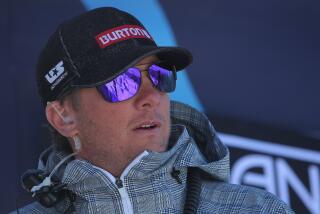Second in series: Bidding process has long perked up IOC
The International Olympic Committee knew years before the Salt Lake City bid scandal erupted that cities vying to host the Games were showering IOC members with lavish excesses, according to the confidential minutes of the IOC’s ruling Executive Board.
The board was briefed about such improprieties as far back as the 1980s. In 1991 it was told about irregularities involving airline tickets, and other “abuses and misconduct.” But those allegations were dismissed as isolated incidents and without thorough inquiry: Because they involved only a few IOC members, the minutes say, reports of “generalized corruption could in no way be taken seriously.”
The records suggest that if the IOC in general and then-President Juan Antonio Samaranch in particular had acted more aggressively, the committee might have avoided the worst corruption crisis in Olympic history.
It came to light in late 1998 amid disclosures that IOC members or their relatives were courted with cash and gifts totaling more than $1 million as part of Salt Lake City’s winning bid for the 2002 Winter Games.
In the days after the scandal became public, and as the search for blame sharpened in intensity, the minutes show that longtime IOC member Marc Hodler of Switzerland told his colleagues that culpability was clear: “It was not the bid cities who were responsible. The IOC was responsible.”
Ten IOC members were either expelled or forced to resign. Six were offered the chance to plead their case before an extraordinary all-members session of the IOC in March 1999. The minutes of that meeting reveal a disbelief that anything improper had occurred.
Sudan’s Gen. Zein El Abdin M.A. Abdel Gadir, for instance, acknowledged that Salt Lake bidders had made payments purportedly for tuition and living expenses, to his son, Zuhair, at Southern Mississippi. A Salt Lake Organizing Committee ethics report said the payments totaled $17,000.
Gadir also convinced the Salt Lake Organizing Committee to send $1,000 a month to his daughter, Zema, in Londonalthough, as it turned out, he didn’t have a daughter at all, and Zema was an abbreviation of sorts for his own name.
Moments before being expelled, the general told his colleagues on the IOC, “It never occurred to me that there was the slightest link between this ... and the bidding of Salt Lake.”
Jean-Claude Ganga of the Republic of Congo, who, according to court documents, received $320,000 in cash and gratuities in connection with the Salt Lake bid, also defended his actions at the 1999 IOC session: “Such simple concepts as hospitality and courtesy have been qualified as attempts to bribe, attempts to corrupt, values such as friendship and solidarity have been defined as offenses; dialogue between the various members of the IOC have been seen as barter and trafficking.”
The scandal in Salt Lake was born of losing the 1998 Winter Games to Nagano, Japanand a determination to do what it took to win the 2002 Olympics.
The two leaders of the Salt Lake City bid, Tom Welch and Dave Johnson, were indicted on federal fraud and other charges in July, 2000. A few months ago, a U.S. judge in Salt Lake City dismissed the case. Prosecutors have appealed the dismissal; a ruling is months or even years away.
But as the Executive Board minute’s show, the case offered a window into the culture of excesses that came to dominate the bid-city process in the aftermath of the 1984 Los Angeles Summer Olympics, which proved it was possible to make money by playing host to the Games.
The unprecedented profit from those games$232.5 millionincreased interest in becoming a host city. L.A., for instance, was the only city in the world that wanted the 1984 Olympics. Immediately after the L.A. Games, six cities sought the 1992 Games.
Because the IOC allowed members to visit cities bidding for the Games, bid teams often spent lavishly to entertain and impress in hopes of cultivating personal relationships and winning votes.
“Salt Lake City [bidders] had not needed to buy votes but had been told by IOC members that they would have no chance to win if they did not do so,” Hodler would tell the Executive Board in 1998. “Cities that had bid and won said nothing because they wanted to maintain a good relationship with the IOC members. Cities that lost and hoped to bid again also felt compelled to remain silent. But that knowledge existed, and everybody who ran an Olympic bid knew about these things.”
But, as the minutes show, corruption concerns were long-standing.
Samaranch, reflecting on the problem at an Executive Board meeting in Los Angeles in February 1982, said he was “concerned” about member visits to Seoul and Nagoya, Japan, the two cities that had sought the 1988 Games. He called it an “unpleasant situation” but said he did not feel “any action could now be taken.”
In his 1985 biography, Ueberroth alleged that bidders from Seoul gave two round-trip, first-class airline tickets to each IOC member. “The tickets were easily redeemed for cash; many were,” Ueberroth wrote.
In December 1991, at a meeting at IOC headquarters in Lausanne, Switzerland, Samaranch told the Executive Board there had been reports of “cases of abuses by individual members.”
He asked Hodler to elaborate about information gleaned when the IOC asked cities who lost bids for the 1996 Summer Games to describe “any incidents of misconduct” involving IOC members.
“From the information given by the candidate cities,” Hodler said, “it had emerged that the biggest abuses had been on air tickets.” He did not elaborate, but added that the board had “combated this by issuing all members’ tickets through the [travel agent] at the IOC headquarters.”
He also said, “Other abuses and misconduct had been fewer than five individual instances, so that the recent press reports of generalized corruption in the IOC could in no way be taken seriously.”
The IOC did not appoint lawyers, accountants or detectives to inquire further, although leaders have since publicly conceded they should have. Reports of irregularities would ultimately surface in connection with Atlanta’s winning bid and from Nagano, Sydney, Toronto and other locales. Those cities denied wrongdoing.
Instead, the IOC sometimes seemed more intent on protecting itself, particularly from members of the press, according to the minutes.
At an Executive Board meeting in Acapulco in November 1992 after the Barcelona Games, Samaranch said he “was not concerned by what had happened so much as what could happen.” He added that he was “particularly worried by the possibility of IOC members in contact with bid committees for the Games in 2000 being trapped in seemingly compromising situations with the media.”
Six years later, at that December 1998 meeting, Samaranch told the board that they “had to protect Salt Lake City, because they had to protect the Games. But before they protected Salt Lake, they had to protect the IOC, and that was the main task they had to face.”
A few months later, Ashwini Kumar of India said at a March 1999 meeting that it was “very criminal” for the press to “keep heaping criticism” on Samaranch.
But in fact it was Hodler who almost single-handedly propelled the Salt Lake story into an international event when he abruptly asserted in December 1998 that he had long been suspicious of corruption in the IOC. He went on to detail for reporters what he described as the systematic buying and selling of the Games.
He cited a pattern of ethical malpractice in the bidding and selection of the Games in Atlanta, Nagano, Sydney and Salt Lake City and said he was going public in hopes of effecting radical reform.
Behind closed doors, he told the ruling inner circle he “had felt that some members of the Executive Board wanted to avoid scandal by ignoring the fact that there were a larger number of corrupt members within the IOC than had been thought.”
Jacques Rogge of Belgium, who last July succeeded Samaranch as IOC president, reflected on the events leading up to the scandal while addressing the opening of the IOC’s 113th session this week here in Salt Lake: “Inappropriate structures and human weaknesses on both sides were the roots of an evil that would have come to light here or somewhere else.”
More to Read
Start your day right
Sign up for Essential California for news, features and recommendations from the L.A. Times and beyond in your inbox six days a week.
You may occasionally receive promotional content from the Los Angeles Times.






